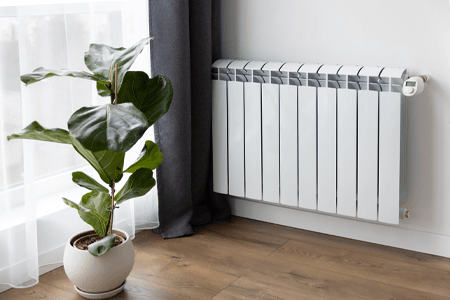Cutting Costs and Carbon in Student Housing with Smart Heating Solutions
Intelligent Heating Controls

Student housing providers face high energy costs from inefficient heating. cThings’ smart solution reduced waste, cut costs, and supported net-zero goals through optimised controls and resident education.
Our brief
Student housing providers often face high energy costs due to residents overheating their rooms and mismanaging heating systems. Since students don’t directly pay for their energy use, there’s little incentive for them to conserve it. A common issue was heating being left on while windows were open, leading to excessive energy bills and unnecessary carbon emissions, hindering the providers’ efforts to achieve net-zero goals We were tasked with developing a low-cost, easy-to-control solution to better manage heating in individual student units.
Our Solution
cThings developed a system that could be installed in the consumer unit of each student let. This was paired with room sensors that monitored both temperature and window status. Occupants could control room temperatures via an app or on-site controls, encouraging responsible heating use through notifications and educational prompts.
The facilities team also had access to real-time data, allowing them to ensure that properties were not overheated. They could remotely adjust settings, especially during holiday periods when many units were unoccupied. The system also automatically reduced heating when a window was opened, preventing unnecessary energy waste.
The results
The cThings heating management solution significantly reduced energy consumption across the student housing properties. With real-time monitoring and the ability to remotely manage heating, the facilities team was able to optimise energy use and prevent overheating. The automated system that reduced heating when windows were open further cut energy waste.
The app helped educate students about energy efficiency, promoting behavioural changes that led to lower energy use. This solution not only reduced energy costs but also contributed to the housing provider's carbon reduction efforts, making measurable progress toward their net-zero objectives.
"Smart heating controls have significantly reduced our energy costs and cut unnecessary carbon emissions. Remote monitoring, especially during holiday periods, has been a game-changer and advanced our net-zero goals."
The benefits
Reduced energy costs
Optimise heating management to reduce overall energy expenses.
Lower carbon emissions
Use heating more efficiently to reduce carbon emissions, supporting sustainability.
Remote control
Monitor and adjust heating remotely, especially during unoccupied periods, to minimise heating waste.
Behavioural change
Encourage efficient energy use through app based education.
Automated adjustments
Heating automatically reduced when windows were opened, preventing energy waste.
Preventative maintenance
Identify and receive alerts for heating systems that require maintenance or replacement.